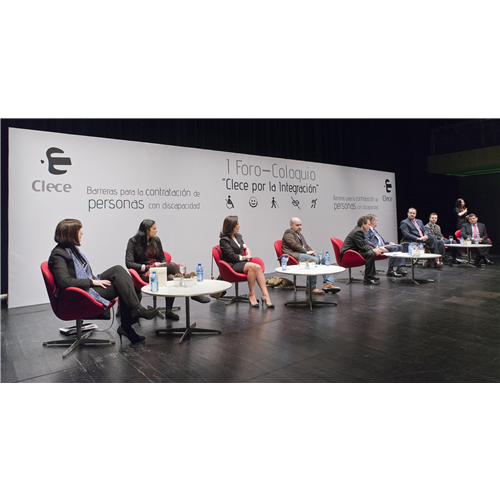
1st “Clece for Integration” Forum : Companies’ ignorance one of the main barriers to hiring people with disabilities
- At the 1st “Clece for Integration” Forum-Conference, the various agents involved in hiring people with disabilities discussed the main barriers to finding work
- As part of its commitment to help people from vulnerable social groups find work, Clece currently employs 3,283 people with disabilities
Madrid, 6 March 2014. The multiservices company Clece held its first day of discussions on the main barriers to hiring people with disabilities. Under the banner “Clece for integration”, the forum acted as a point of encounter for the various social agents involved in helping disabled people find work, with all them agreeing that ignorance among businesses is one of the main difficulties preventing people with disabilities from finding work.
This was the first edition of this forum, “which was created with continuity in mind, and within the social commitment shown by Clece that ensures work for 3,283 people with disabilities,” explained Clece chairman Cristóbal Valderas. “This social commitment goes beyond a corporate social responsibility policy, and forms part of an authentic corporate culture,” Valderas added.
Moderated by the journalist José Manuel Dolader, the conference included the involvement of Ignacio Tremiño, managing director of Disability Policies; Luis Cayo, chairman of CERMI; Purificación González, human resources director at Clece; and Juan José Laguna, director of the Integra Group. Clece employee Víctor Isidro and Integra workers Lorena Mateo and Reyes Cabet also attended to give an account of their experience of looking for work.
The conference’s opening speech by Ignacio Tremiño highlighted the positive evolution that has taken place in recent years in Spain in terms of people with disabilities finding work. Even in the context of the crisis, in 2013 “employment among disabled people has grown by 14 per cent”, although there is still much work to be done, just as there is in the field of raising awareness, which “has improved greatly but where there is still a lot of ignorance in the business world. Jobs are created by businesses, and there is work to be done before they will place their trust in people with disabilities”.
CERMI chairman Luis Cayo welcomed the growth of 14 per cent in the number of jobs among people with disabilities, but pointed out that “the base we are starting from is very low”, and that the employment rate is 40 per cent lower than with the rest of the population. “We’re faced with a structural problem that needs approaching with extraordinary measures”.
Juan José Laguna, Director of the Integra Group, made a distinction between tangible barriers, such as the “lack of professional qualifications” and intangible barriers such as “the ignorance of companies” and their “fear of hiring because they lack prior experience, because of their fear of the unknown”, as well as “stigmas or preconceived ideas about the professionalism of people with disabilities”. Representing special employment centres, Juan José Laguna pointed out the role these centres play in improving employability and making the disabled workforce much more visible. He pointed out that there are currently “72,000 people with disabilities in special employment centres”.
Purificación González spoke of the ignorance among businesses as one of the main barriers for successful integration into the workplace, “so much work needs to be done to raise awareness and do away with this fear of the unknown”. From her experience as director of human resources at Clece, González said that the key for a hiring company is “to provide equal opportunities”.
Víctor Isidro, training manager at the Queen Sofía Foundation Alzheimer’s Centre, told how in his specific case and with a disability from birth, “he has never found rejection in the world of work” and asked businesses to “trust” workers with disabilities, stressing their capacity for hard work as setting them apart: “you can ask more of us because we’re used to life asking more of us”.
Integra receptionist Lorena Mateo told of the different obstacles that she has had to overcome in both her education and her career. She felt that having a non-visible disability meant she had to repeatedly provide justifications and deal with situations where people did not believe that she did have a disability. Integra employee Reyes Cabet agreed with this view. With a disability acquired ten years ago, she explained that “if the disability can’t be seen, then it’s more difficult. We can’t spend our whole lives having to explain ourselves.”
Ending the debate, Cristóbal Valderas called for “integration in the workplace for people with disabilities to be real and sustainable”, and that the key lies in “normalising disability”. For such a process to succeed, awareness needs to be raised among businesses to encourage them to trust in hiring people with disabilities.
Social commitment to equal opportunities
The 1st “Clece for Integration” Forum is part of Clece’s social commitment to helping disadvantaged people, particularly people with disabilities, find work. The company has 3,283 disabled people on its workforce, and through its special employment centre, INTEGRA CEE, helps people with disabilities to find work and companies to comply with the Law on the Social Integration of People with Disabilities (LISMI) through alternative measures. Integra currently employs 1,376 people with disabilities, a full 90 per cent of its workforce.
This work by the company also extends to other collectives, such as women who have suffered gender-based violence, people at risk of social exclusion, and jobless young people. To achieve this Clece collaborates with more than 200 associations. Clece currently employs around 68,000 people in Spain.
